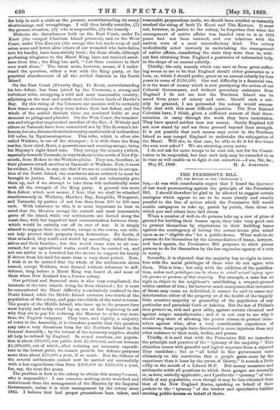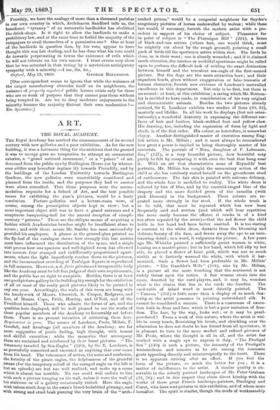THE PERMISSIVE BILL.
(TO THE EDITOR OF THE "SPECTATOR."] Six,—It was with considerable regret that I found the Spectator of last week pronouncing against the principle of the Permissive Bill. I should therefore be glad to be allowed to suggest certain analogies which appear to me to be more closely and exactly parallel to the line of action which the Permissive Bill would enable ratepayers to take up, parish by parish, than those on which you and others have laid stress.
When a number of well-to-do persons take up a row of plots of ground for building their houses upon, they take very good care to protect themselves by stipulations in their building leases against the contingency of having the corner-house plot seized upon as an " eligible site" for a public-house. What well-to-do persons do for themselves by the intermediation of leases, lawyers, and land agents, the Permissive Bill proposes to allow poorer persons to do for themselves by the less expensive agency of a vote in vestry.
Secondly, it is objected that the majority has no right to interfere with the social privileges of those who do not agree with them. This is true ; but only with the addition of the qualification, unless such privileges can be shown to entail actual injury upon the purses or persons of that majority. For example, a man has no right to object to his neighbour's establishing a croquet-ground within earshot of him ; for however much annoyance that invention of Satan may cause an individual, it cannot be said to cause any deterioration either of the property or of the health of the happily little sensitive majority or generality of the population of any particular and parochial Gath or Askelon. But the law of Philistia does protect us, rich and poor alike, against certain chemical and against catgut manufactories ; and it is not easy to see why it should stop short of allowing the poorer classes to protect themselves against what, after a very considerable experience of nuisances, these people have discovered is more injurious than any other nuisance to their souls, bodies, and purses.
Thirdly, it is said that with the Permissive Bill we introduce the principle and practice of the " tyranny of the majority." This objection comes with graceful and logical sequence from a rejected Tory candidate ; but as " all belief in free government rests ultimately on the conviction that a people gains more by the experience than it loses by the errors of liberty," it sounds a little oddly in the mouth of a Liberal M.P. But money measures and arithmetic settle all questions to which these gauges are severally or, as here, unitedly applicable; and I prefer the " tyranny " of twothirds of any population, even though it may be less educated than that of the New England States, speaking on behalf of their pockets to the " tyranny " of the brewer and speculative builder erecting public-houses on behalf of theirs.
Fourthly, we have the analogy of more than a thousand parishes in our own country in which, Archdeacon Sandford tells us, the beneficent "tyranny" of an autocratic landholder has abolished the drink-shops. Is it right to allow the landlords to make a prohibitory law, and at the same time to forbid the majority of the ratepayers to avail themselves of a permissive one ? One at least of the landlords in question does, by his vote, appear to have thought this was fair dealing, and he has done what his vote could do towards perpetuating in towns the existence of evils which he will not tolerate on his own manor. I trust events may show that he was actuated in thus voting by a mysterious anticipatory sympathy with a minority.—I am, Sir, &c.,
Oxford, May 19, 1869. GEORGE ROLLESTON.
[Our correspondent seems to ignore that while the nuisance of the catgut manufactory obtrudes itself on its neighbours, the nuisance of properly regulated public houses exists only for those who are so weak of purpose that they cannot pass them without being tempted in. Are we to deny moderate enjoyments to the minority because the majority distrust their own moderation ?— ED. Spectator.]































 Previous page
Previous page